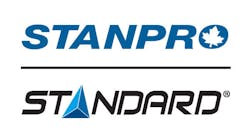As NAFTA turns five years old, electrical companies doing business across the continent are finding both positive and negative implications.
Five years after its birth, NAFTA, the world's largest trade agreement, has created jobs, money and a few disappointments, industry experts say. Since the North American Free Trade Agreement started in 1994, the electrical industry has seen an increased number of companies practicing business across the borders of Canada, the U.S. and Mexico. During 1998 alone, U.S. exports to Mexico and Canada increased by $11 billion, according to the U.S. Department of Commerce. In 1997, Mexico displaced Japan to become the third largest trading partner for the U.S. and has averaged $11 billion per year in foreign direct investment since the implementation of NAFTA. Trade between Mexico and Canada also increased between 1994 and 1997 by 34.3%.
By some accounts, NAFTA has simply accelerated a trend that was already underway in the electrical industry. "This industry has been moving on a North American, if not global basis, anyway," says Jim McCarthy, president and chief executive officer of Toronto-based Electro-Federation of Canada. "NAFTA has helped speed that up in terms of how they (the electrical industry) approach the North American market, just by removing some of the barriers such as standards and certification practice."
NAFTA is forcing U.S. electrical manufacturers to take a second look at the strategies they use in the North American market. For example, last year Cutler-Hammer/Eaton restructured its top management to focus on new opportunities created by the improved cross-border relationship and communications with Mexico and Canada, says Spencer Duin, vice president of operations for the Pittsburgh, Pa.-based company.
"NAFTA has allowed us to look at what product we are supplying to those foreign markets and then how to incorporate manufacturing strategies that make sense for those markets," he says.
Cutler-Hammer has had two operations in Mexico for about 40 years, Duin says. The company's subsidiary Cutler-Hammer Mexicana has a plant in Ju rez and another manufacturing and sales facility in Mexico City that serves the Mexican electrical industry. This Mexican subsidiary, with just under 1,000 workers, was recently expanded because of high demand in the Mexican market, Duin says. If current growth continues, Duin expects further expansions in Mexico.
Cutler-Hammer is also well established in Canada with seven sales offices and six manufacturing facilities, but Canadian-American trade has always been relatively open. The company expects more developments in Mexico, though they may be slow in coming, Duin says.
"We have yet to see a lot of the benefits that are going to come from a much closer connection with the Mexican market and the U.S. market, which are natural trading partners," Duin says. "I think some of the pre-NAFTA barriers have changed because NAFTA has created an atmosphere in which we are working together more as partners rather than the U.S. being the heavyweight, working with our low-income cousin to the South. We have earned more respect for each other." While NAFTA has opened windows of opportunity for many electrical companies in these three nations, there are issues still to be resolved. Standardization of products, increased customs paperwork and poor government support have been sore issues in the electrical industry.
Some industry experts hope the Mexican electrical industry will follow the U.S. National Electrical Code. "Mexico, because of NAFTA, has completely revamped its products approval system and with that the whole standard development program there," says Frank Kitzantides, vice president of engineering for the National Electrical Manufacturers Association (NEMA) and secretary general of CANENA (Consejo de Armonizacion de Normas Electrotecnicas de las Naciones de las Americas, or Council for Harmonization of Electrotechnical Standards of the Nations of the Americas). "They have decided to essentially develop voluntary standards and reduce the number of mandatory standards, the NOMs (Normas Oficiales Mexicanas or Mexican Official Norms), that were government controlled."
The difference the industry has seen with NAFTA is the opportunity to learn more about how Mexico develops its standards, and to some extent be able to influence them in terms of what already existsin the U.S., he adds.
Others believe NAFTA has made little difference in the way of paperwork. "We have yet to maximize the potential in Mexico. There is a substantial bureaucracy in Mexico as the government has its hands in every area," says John O'Donnell, managing director of Electro-Mechanical Systems International Ltd., Philadelphia, Pa. The international rep has had an operation in Mexico City, EMSI/Mexico, serving the industrial and utility markets since the 1980s. "NAFTA documentation continues to be somewhat of a nuisance. Thus, the actual documentation process and marking of products remains as cumbersome as in the past. However, the gradual reduction of duties and the overall investment fostered by NAFTA has certainly helped our business grow and should enable it to rapidly escalate in the future."








